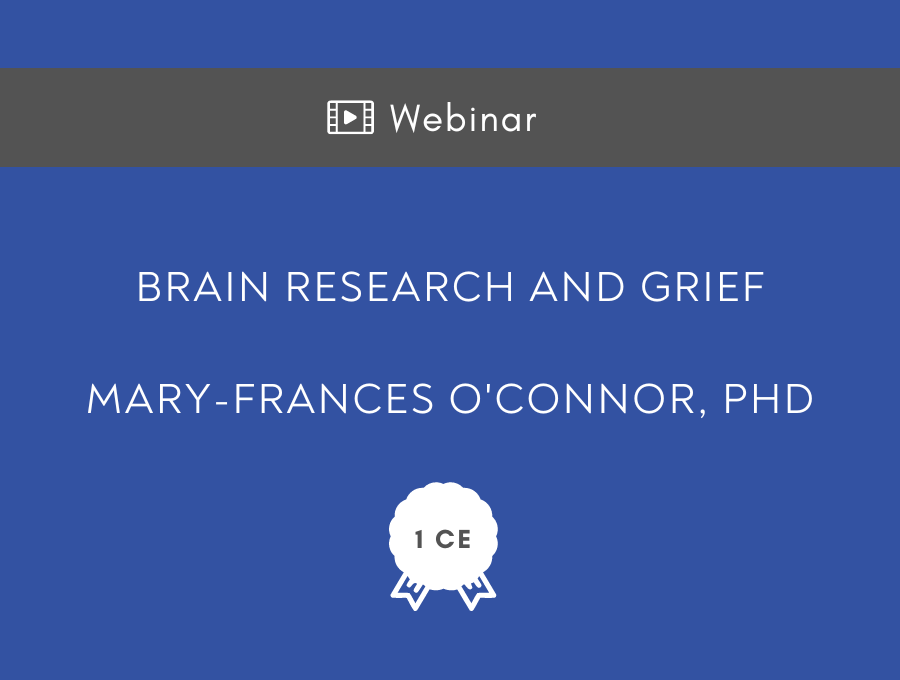
Brain Research and Grief – 1 CE Hour
About Course
The brain plays a unique role in shaping our experience of bereavement. This webinar given by Dr. Mary-Frances O’Connor, a leading researcher in grief biology, will introduce participants to several kinds of brain data that can inform clinical work: neuroimaging studies of bereavement in general and of complicated grief animal studies of bonding and separation that can help us understand what happens in humans after bereavement knowledge about how the brain learns new information that can inform our understanding of the trajectory of adaptation during bereavement studies of cognitive functioning, particularly relevant for how this affects bereaved older adults. Dr. O’Connor is also a talented clinician and she will conclude the webinar with her observations about the clinical relevance of this neuroscience research.Description
The brain plays a unique role in shaping our experience of bereavement.This webinar given by Dr. Mary-Frances O’Connor, a leading researcher in grief biology, will introduce participants to several kinds of brain data that can inform clinical work:
- neuroimaging studies of bereavement in general and of complicated grief
- animal studies of bonding and separation that can help us understand what happens in humans after bereavement
- knowledge about how the brain learns new information that can inform our understanding of the trajectory of adaptation during bereavement
- studies of cognitive functioning, particularly relevant for how this affects bereaved older adults
Dr. O’Connor is also a talented clinician and she will conclude the webinar with her observations about the clinical relevance of this neuroscience research.
Webinar recorded on July 19, 2019.
Learning Objectives
- Identify how bereavement affects brain cognition and emotion during the process of adaptation
- Explain the relevance of the biology of bonding and separation in animals to our understanding of acute grief in humans
- Describe ways knowledge of cognitive functioning may be especially important for work with bereaved older adults with and without complicated grief
About the Presenter
Mary-Frances O’Connor, PhD is Associate Professor in the Psychology Department at the University of Arizona where she is the Director of Clinical Training and heads the Grief, Loss and Social Stress (GLASS) Lab. Scientific contributions from her research include how the brain processes the death of a loved one and biomarkers of adaptation during grief, primarily in the autonomic and endocrine stress response systems and the immune system. Finally, her work in clinical psychology has helped to validate the diagnosis of Complicated Grief, and points to mechanisms that may maintain this disorder. Dr. O’Connor has a forthcoming popular science book on about grief and the brain.
Continuing Education
American Psychological Association
The Center for Prolonged Grief at Columbia School of Social Work is approved by the American Psychological Association to sponsor continuing education for psychologists. The Center for Prolonged Grief maintains responsibility for this program and its content.
Note: Many state boards recognize the APA approval. Please check with your state licensing board.
New York State Education Department
- NYSED State Board for Psychology recognizes the Center for Prolonged Grief as an approved provider of continuing education for licensed psychologists (#PSY-0150).
- NYSED Board for Social Work recognizes the Center for Prolonged as an approved provider of continuing education for licensed social workers (#SW‐0727).
- NYSED State Board for Mental Health Practitioners recognizes the Center for Prolonged Grief as an approved provider of continuing education for licensed mental health counselors (#MHC-0104) and licensed marriage and family therapists (#MFT-0080).
Note: Non-NYS social workers, mental health counselors, marriage and family therapists, and other professionals, please check with your state licensing board. Many states have recognized our continuing education programs as we are at a CSWE-accredited institution and part of a regionally accredited university.
Course Content
Brain Research and Grief
-
Watch the webinar
01:05:35 -
Take the post-test
-
Post-webinar evaluation
00:00
About the instructors
2 Courses
13 students
8 Courses
0 students
41 Courses
395 students
